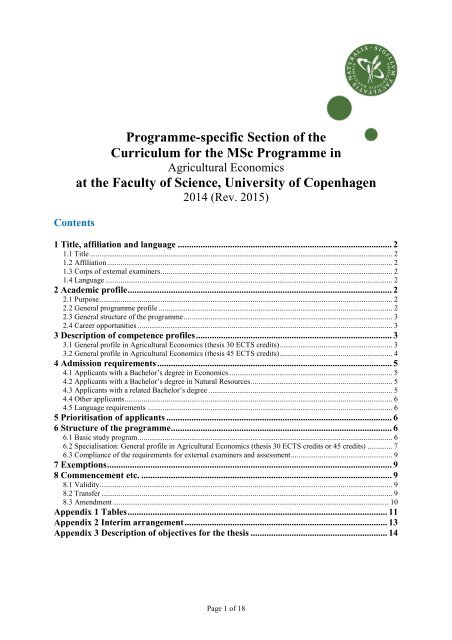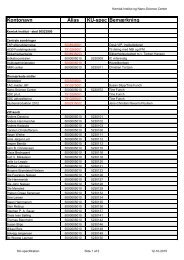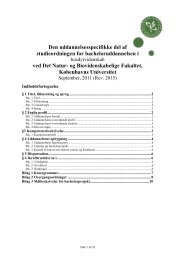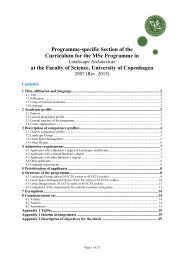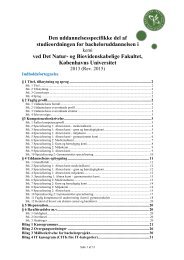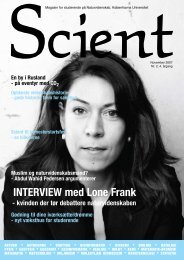Programme-specific Section of the Curriculum for the MSc ...
Programme-specific Section of the Curriculum for the MSc ...
Programme-specific Section of the Curriculum for the MSc ...
Create successful ePaper yourself
Turn your PDF publications into a flip-book with our unique Google optimized e-Paper software.
<strong>Programme</strong>-<strong>specific</strong> <strong>Section</strong> <strong>of</strong> <strong>the</strong><br />
<strong>Curriculum</strong> <strong>for</strong> <strong>the</strong> <strong>MSc</strong> <strong>Programme</strong> in<br />
Agricultural Economics<br />
at <strong>the</strong> Faculty <strong>of</strong> Science, University <strong>of</strong> Copenhagen<br />
2014 (Rev. 2015)<br />
Contents<br />
1 Title, affiliation and language .............................................................................................. 2<br />
1.1 Title .............................................................................................................................................................. 2<br />
1.2 Affiliation ..................................................................................................................................................... 2<br />
1.3 Corps <strong>of</strong> external examiners ......................................................................................................................... 2<br />
1.4 Language ...................................................................................................................................................... 2<br />
2 Academic pr<strong>of</strong>ile .................................................................................................................... 2<br />
2.1 Purpose ......................................................................................................................................................... 2<br />
2.2 General programme pr<strong>of</strong>ile .......................................................................................................................... 2<br />
2.3 General structure <strong>of</strong> <strong>the</strong> programme ............................................................................................................. 3<br />
2.4 Career opportunities ..................................................................................................................................... 3<br />
3 Description <strong>of</strong> competence pr<strong>of</strong>iles ...................................................................................... 3<br />
3.1 General pr<strong>of</strong>ile in Agricultural Economics (<strong>the</strong>sis 30 ECTS credits)........................................................... 3<br />
3.2 General pr<strong>of</strong>ile in Agricultural Economics (<strong>the</strong>sis 45 ECTS credits)........................................................... 4<br />
4 Admission requirements ....................................................................................................... 5<br />
4.1 Applicants with a Bachelor’s degree in Economics ..................................................................................... 5<br />
4.2 Applicants with a Bachelor’s degree in Natural Resources .......................................................................... 5<br />
4.3 Applicants with a related Bachelor’s degree ................................................................................................ 5<br />
4.4 O<strong>the</strong>r applicants ............................................................................................................................................ 6<br />
4.5 Language requirements ................................................................................................................................ 6<br />
5 Prioritisation <strong>of</strong> applicants ................................................................................................... 6<br />
6 Structure <strong>of</strong> <strong>the</strong> programme ................................................................................................. 6<br />
6.1 Basic study program ..................................................................................................................................... 6<br />
6.2 Specialisation: General pr<strong>of</strong>ile in Agricultural Economics (<strong>the</strong>sis 30 ECTS credits or 45 credits) ............. 7<br />
6.3 Compliance <strong>of</strong> <strong>the</strong> requirements <strong>for</strong> external examiners and assessment ..................................................... 9<br />
7 Exemptions ............................................................................................................................. 9<br />
8 Commencement etc. .............................................................................................................. 9<br />
8.1 Validity ......................................................................................................................................................... 9<br />
8.2 Transfer ........................................................................................................................................................ 9<br />
8.3 Amendment ................................................................................................................................................ 10<br />
Appendix 1 Tables .................................................................................................................. 11<br />
Appendix 2 Interim arrangement ......................................................................................... 13<br />
Appendix 3 Description <strong>of</strong> objectives <strong>for</strong> <strong>the</strong> <strong>the</strong>sis ............................................................ 14<br />
Page 1 <strong>of</strong> 18
1 Title, affiliation and language<br />
A shared section that applies to all BSc and <strong>MSc</strong> <strong>Programme</strong>s at <strong>the</strong> Faculty <strong>of</strong> Science is<br />
linked to this programme-<strong>specific</strong> curriculum.<br />
1.1 Title<br />
The <strong>MSc</strong> <strong>Programme</strong> in Agricultural Economics leads to a Master <strong>of</strong> Science (<strong>MSc</strong>) in<br />
Agricultural Economics with <strong>the</strong> Danish title: Cand.oecon.agro. (candidatus/candidata<br />
oeconomiae agronomiae).<br />
1.2 Affiliation<br />
The programme is affiliated with <strong>the</strong> Study Board <strong>for</strong> Natural Resources and Environment,<br />
and <strong>the</strong> students can both elect, and be elected, to this study board.<br />
1.3 Corps <strong>of</strong> external examiners<br />
The following corps <strong>of</strong> external examiners is used <strong>for</strong> <strong>the</strong> central parts <strong>of</strong> <strong>the</strong> <strong>MSc</strong><br />
<strong>Programme</strong>:<br />
Corps <strong>of</strong> External Examiners <strong>for</strong> Agricultural Science (jordbrugsvidenskab).<br />
1.4 Language<br />
The language <strong>of</strong> this <strong>MSc</strong> <strong>Programme</strong> is English.<br />
2 Academic pr<strong>of</strong>ile<br />
2.1 Purpose<br />
On <strong>the</strong> basis <strong>of</strong> economic, ma<strong>the</strong>matical, legal and statistical methodologies, <strong>the</strong> objective <strong>of</strong><br />
<strong>the</strong> <strong>MSc</strong> programme in Agricultural Economics is to:<br />
Enhance <strong>the</strong> academic knowledge and skills <strong>of</strong> <strong>the</strong> student and streng<strong>the</strong>n <strong>the</strong><br />
<strong>the</strong>oretical and methodological qualifications, competences and level <strong>of</strong> independence<br />
attained at bachelor level.<br />
Provide <strong>the</strong> student with <strong>the</strong> opportunity to study in depth <strong>the</strong> advanced academic<br />
aspects <strong>of</strong> disciplines and methods in <strong>the</strong> subject area(s), including training in<br />
academic work and methods, which fur<strong>the</strong>r develop <strong>the</strong> student’s ability and<br />
competences to work in a specialist pr<strong>of</strong>essional capacity and take part in academic<br />
development work.<br />
Qualify <strong>the</strong> student <strong>for</strong> fur<strong>the</strong>r studies, including PhD programmes.<br />
2.2 General programme pr<strong>of</strong>ile<br />
The <strong>MSc</strong> programme in Agricultural Economics is focused on applied economic <strong>the</strong>ory and<br />
methods within <strong>the</strong> agricultural sector in broad terms. These include:<br />
<br />
<br />
<br />
International Economics and Development which cover international trade, trade<br />
policy, public economics, economic growth, development economics and policy and<br />
<strong>the</strong> economics <strong>of</strong> globalization.<br />
Agribusiness and Food Economics which cover production economics, industrial<br />
economics and organisation, technology assessment, innovation and management as<br />
well as public economics and policy.<br />
Environmental and Natural Resource Economics which cover economic <strong>the</strong>ory <strong>of</strong><br />
environmental policies, economic valuation methods and <strong>the</strong>ory <strong>of</strong> optimal extraction<br />
<strong>of</strong> natural resources over time.<br />
Page 2 <strong>of</strong> 18
The programme <strong>of</strong>fers a wide range <strong>of</strong> restricted elective course that enables students<br />
to create <strong>the</strong>ir own unique pr<strong>of</strong>ile combining <strong>the</strong> economic specializations mentioned<br />
above.<br />
Agricultural economics is <strong>the</strong> key subject area <strong>of</strong> <strong>the</strong> programme.<br />
2.3 General structure <strong>of</strong> <strong>the</strong> programme<br />
The <strong>MSc</strong> <strong>Programme</strong> is set at 120 ECTS credits.<br />
The <strong>MSc</strong> <strong>Programme</strong> in Agricultural Economics consists <strong>of</strong> <strong>the</strong> following elements:<br />
Basic study programme, 60 ECTS credits.<br />
Specialisation, 60 ECTS credits, including <strong>the</strong> <strong>the</strong>sis.<br />
The student must choose one <strong>of</strong> <strong>the</strong> following specialisations:<br />
General pr<strong>of</strong>ile in Agricultural Economics (<strong>the</strong>sis, 30 ECTS credit).<br />
General pr<strong>of</strong>ile in Agricultural Economics (<strong>the</strong>sis, 45 ECTS credit).<br />
2.4 Career opportunities<br />
The <strong>MSc</strong> <strong>Programme</strong> in Agricultural Economics qualifies students <strong>for</strong> a PhD programme, and<br />
depending on <strong>the</strong> academic specialisation it may also be targeted at business functions and/or<br />
areas such as:<br />
<br />
<br />
<br />
<br />
<br />
<br />
Interest groups and industrial organisations.<br />
Consultancy and analytical work in a broad sense (banks, financial institutions, large<br />
companies, consultancy companies, and agricultural organisations etc.).<br />
Public administration (<strong>the</strong> EU, government, regions and municipalities).<br />
Research (private and public).<br />
Teaching (universities and business schools etc.).<br />
Management <strong>of</strong> own company.<br />
3 Description <strong>of</strong> competence pr<strong>of</strong>iles<br />
Students following <strong>the</strong> <strong>MSc</strong> <strong>Programme</strong> acquire <strong>the</strong> knowledge, skills and competences listed<br />
below. Students will also acquire o<strong>the</strong>r qualifications through elective subject elements and<br />
o<strong>the</strong>r study activities.<br />
3.1 General pr<strong>of</strong>ile in Agricultural Economics (<strong>the</strong>sis 30 ECTS credits)<br />
On completion <strong>of</strong> <strong>the</strong> programme, an <strong>MSc</strong> in Agricultural Economics with a specialisation in<br />
Agricultural Economics (<strong>the</strong>sis 30 ECTS credits) has acquired <strong>the</strong> following:<br />
Knowledge about:<br />
How to demonstrate general knowledge <strong>of</strong> economic issues, <strong>the</strong>ories and<br />
methodologies within International Economics and Development, and/or Agribusiness<br />
and Food Economics, and/or Environmental and Natural Resource Economics.<br />
How to identify economic and statistical methods within <strong>the</strong> above disciplines.<br />
How to identify economic agents and <strong>the</strong> background <strong>for</strong> <strong>the</strong>ir actions.<br />
How to re<strong>for</strong>mulate <strong>the</strong>ories, principles and research findings to independently <strong>for</strong>m<br />
hypo<strong>the</strong>ses and <strong>the</strong>ories.<br />
Skills to:<br />
Pose questions that are characteristic <strong>of</strong> agricultural economics and produce several<br />
possible answers.<br />
Page 3 <strong>of</strong> 18
Analyse issues within agricultural economics and <strong>the</strong> associated decision-making<br />
processes.<br />
Formulate and solve complex economic and food economic problems, taking a<br />
<strong>the</strong>oretical, statistical and descriptive approach.<br />
Utilise and evaluate economic methodologies and evaluate <strong>the</strong> fundamental<br />
assumptions behind economic <strong>the</strong>ories as well as <strong>the</strong>ir possibilities and limitations.<br />
Employ economic reasoning to explain economic claims.<br />
Work methodologically correct with both qualitative and quantitative analyses.<br />
Communicate own specialist knowledge clearly and precisely – in writing and orally –<br />
to various target groups.<br />
Select and use appropriate in<strong>for</strong>mation and communications technology in all relevant<br />
work processes.<br />
Competences to:<br />
Take a critical and visionary approach to economic methodologies and <strong>the</strong><br />
fundamental assumptions behind agricultural economics.<br />
Assess <strong>the</strong> possibilities and limitations <strong>of</strong> <strong>the</strong> <strong>the</strong>ories and <strong>the</strong>ir potential applications<br />
in various work-related contexts.<br />
Handle work and development situations that are complex, unpredictable and require<br />
new solution models in <strong>the</strong> private and public-sector labour markets – both nationally<br />
and internationally.<br />
Transfer and apply <strong>the</strong>ories and principles to new but related economic issues.<br />
Implement and carry out mono-disciplinary and interdisciplinary collaboration and<br />
assume pr<strong>of</strong>essional responsibility.<br />
Assume independent responsibility <strong>for</strong> and evaluate own pr<strong>of</strong>essional development<br />
and specialisation with a view to life-long learning.<br />
Work with o<strong>the</strong>rs, discuss solutions and achieve consensus.<br />
3.2 General pr<strong>of</strong>ile in Agricultural Economics (<strong>the</strong>sis 45 ECTS credits)<br />
On completion <strong>of</strong> <strong>the</strong> programme, an <strong>MSc</strong> in Agricultural Economics with a specialisation in<br />
Agricultural Economics (<strong>the</strong>sis 45 ECTS credits) has acquired <strong>the</strong> following:<br />
Knowledge about:<br />
How to demonstrate general knowledge <strong>of</strong> economic issues, <strong>the</strong>ories and<br />
methodologies within International Economics and Development, and/or Agribusiness<br />
and Food Economics, and/or Environmental and Natural Resource Economics.<br />
How to identify economic and statistical methods within <strong>the</strong> above disciplines.<br />
How to identify economic agents and <strong>the</strong> background <strong>for</strong> <strong>the</strong>ir actions.<br />
How to re<strong>for</strong>mulate <strong>the</strong>ories, principles and research findings to independently <strong>for</strong>m<br />
hypo<strong>the</strong>ses and <strong>the</strong>ories.<br />
Skills to:<br />
Pose questions that are characteristic <strong>of</strong> agricultural economics and produce several<br />
possible answers.<br />
Analyse issues within agricultural economics and <strong>the</strong> associated decision-making<br />
processes.<br />
Formulate and solve complex economic and food economic problems, taking a<br />
<strong>the</strong>oretical, statistical and descriptive approach.<br />
Collect and process primary data<br />
Utilise and evaluate economic methodologies and evaluate <strong>the</strong> fundamental<br />
assumptions behind economic <strong>the</strong>ories as well as <strong>the</strong>ir possibilities and limitations.<br />
Page 4 <strong>of</strong> 18
Employ economic reasoning to explain economic claims.<br />
Work methodologically correct with both qualitative and quantitative analyses.<br />
Communicate own specialist knowledge clearly and precisely – in writing and orally –<br />
to various target groups.<br />
Select and use appropriate in<strong>for</strong>mation and communications technology in all relevant<br />
work processes.<br />
Competences to:<br />
Take a critical and visionary approach to economic methodologies and <strong>the</strong><br />
fundamental assumptions behind agricultural economics.<br />
Assess <strong>the</strong> possibilities and limitations <strong>of</strong> <strong>the</strong> <strong>the</strong>ories and <strong>the</strong>ir potential applications<br />
in various work-related contexts.<br />
Handle work and development situations that are complex, unpredictable and require<br />
new solution models in <strong>the</strong> private and public-sector labour markets – both nationally<br />
and internationally.<br />
Transfer and apply <strong>the</strong>ories and principles to new but related economic issues.<br />
Implement and carry out mono-disciplinary and interdisciplinary collaboration and<br />
assume pr<strong>of</strong>essional responsibility.<br />
Assume independent responsibility <strong>for</strong> and evaluate own pr<strong>of</strong>essional development<br />
and specialisation with a view to life-long learning.<br />
Work with o<strong>the</strong>rs, discuss solutions and achieve consensus.<br />
4 Admission requirements<br />
Students are admitted to <strong>the</strong> <strong>MSc</strong> <strong>Programme</strong> in Agricultural Economics once a year, with<br />
studies starting on 1 September.<br />
Applicants with a Bachelor’s degree in Agricultural Economics from <strong>the</strong> University <strong>of</strong><br />
Copenhagen who complete <strong>the</strong>ir Bachelor’s degree in block 1 or 2 may additionally be<br />
admitted to <strong>the</strong> <strong>MSc</strong> <strong>Programme</strong> in Agricultural Economics with studies starting on 1<br />
February <strong>of</strong> <strong>the</strong> academic year in question.<br />
4.1 Applicants with a Bachelor’s degree in Economics<br />
Applicants with a Bachelor’s degree in Economics from <strong>the</strong> University <strong>of</strong> Copenhagen, o<strong>the</strong>r<br />
Danish or Nordic universities are directly academically qualified <strong>for</strong> admission to <strong>the</strong> <strong>MSc</strong><br />
<strong>Programme</strong>.<br />
4.2 Applicants with a Bachelor’s degree in Natural Resources<br />
Applicants with a BSc degree in Natural Resources with <strong>the</strong> specialization in Environmental<br />
Economics are admitted provided that <strong>the</strong>ir examination includes <strong>the</strong> following specified<br />
subject element:<br />
NIFB13011U Macro Economics and Business Cycles 7.5 ECTS credits<br />
(Makroøkonomi og konjunkturer)<br />
4.3 Applicants with a related Bachelor’s degree<br />
Applicants with a Bachelor’s degree from <strong>the</strong> University <strong>of</strong> Copenhagen, o<strong>the</strong>r Danish or<br />
international universities may also be admitted if <strong>the</strong>ir programme includes <strong>the</strong> following:<br />
Micro Economics (at least 22.5 ECTS credits)<br />
Macro Economics (at least 15 ECTS credits)<br />
International Economics (at least 7.5 ECTS credits)<br />
Statistics (at least 7.5 ECTS credits)<br />
Page 5 <strong>of</strong> 18
Econometrics (at least 7.5 ECTS credits)<br />
Ma<strong>the</strong>matics (at least 7.5 ECTS credits)<br />
4.4 O<strong>the</strong>r applicants<br />
The Faculty may also admit applicants who, after a thorough academic assessment, are<br />
deemed to possess a Bachelor’s degree with educational qualifications equivalent to those<br />
required in Subclauses 4.1- 3.<br />
4.5 Language requirements<br />
4.5.1 Applicants from Nordic universities<br />
Applicants with a Bachelor’s degree from Nordic universities must as a minimum document<br />
English language qualifications comparable to a Danish upper secondary school English B<br />
level.<br />
4.5.2 Non-Nordic applicants<br />
Applicants with a non-Nordic Bachelor’s degree must be able to document English<br />
pr<strong>of</strong>iciency corresponding to an IELTS test score <strong>of</strong> minimum 6.5 or a TOEFL test score <strong>of</strong><br />
minimum 213 (computer-based), 560 (paper-based) or 83 (Internet-based).<br />
5 Prioritisation <strong>of</strong> applicants<br />
If <strong>the</strong> number <strong>of</strong> qualified applicants to <strong>the</strong> programme exceeds <strong>the</strong> number <strong>of</strong> places<br />
available, applicants will be prioritised as follows:<br />
1) Applicants with a Bachelor’s degree in Agricultural Economics from <strong>the</strong> University <strong>of</strong><br />
Copenhagen seeking admission by way <strong>of</strong> direct extension <strong>of</strong> <strong>the</strong>ir completed BSc<br />
programme.<br />
2) Applicants with a Bachelor’s degree in Agricultural Economics and applicants with a<br />
Bachelor’s degree in Natural Resources from <strong>the</strong> University <strong>of</strong> Copenhagen.<br />
3) O<strong>the</strong>r applicants.<br />
Applicants are <strong>the</strong>n prioritised according to academic qualifications.<br />
6 Structure <strong>of</strong> <strong>the</strong> programme<br />
The compulsory subject elements, restricted elective subject elements and <strong>the</strong> <strong>the</strong>sis constitute<br />
<strong>the</strong> central parts <strong>of</strong> <strong>the</strong> programme (<strong>Section</strong> 21 <strong>of</strong> <strong>the</strong> Ministerial Order on Bachelor and<br />
Master’s <strong>Programme</strong>s (Candidatus) at Universities).<br />
All <strong>of</strong> <strong>the</strong> compulsory subject elements (including <strong>the</strong> <strong>the</strong>sis) defined below must be followed<br />
at <strong>the</strong> exact time planned according to <strong>the</strong> table in Appendix 1. Restricted elective and<br />
elective subject elements may be freely placed in <strong>the</strong> remaining blocks within a specialisation.<br />
Be<strong>for</strong>e <strong>the</strong> end <strong>of</strong> <strong>the</strong> basic study program <strong>the</strong> student must choose a specialisation. If a<br />
specialisation is not chosen <strong>the</strong> student will automatically be registered with <strong>the</strong> following<br />
specialisation:<br />
General pr<strong>of</strong>ile in Agricultural Economics (<strong>the</strong>sis, 30 ECTS credits).<br />
6.1 Basic study program<br />
Page 6 <strong>of</strong> 18
The basic study program is set at 60 ECTS credits and consists <strong>of</strong> <strong>the</strong> following:<br />
Compulsory subject elements, 15 ECTS credits.<br />
Restricted elective subject elements, 45 ECTS credits.<br />
6.1.1 Compulsory subject elements<br />
All <strong>of</strong> <strong>the</strong> following subject elements are to be covered (15 ECTS credits):<br />
LOJK10272U Applied Econometrics Block 1 7.5 ECTS credits<br />
NIFK14003U Incentives and Regulations Block 3 7.5 ECTS credits<br />
6.1.2 Restricted elective subject elements<br />
15 ECTS credits are to be covered as subject elements from <strong>the</strong> following list:<br />
NIFK14022U Industrial Organization Block 1 7.5 ECTS credits<br />
NIFK14023U Advanced International Trade I Block 1 7.5 ECTS credits<br />
LOJK10265U Studies in Development Economics Block 2 7.5 ECTS credits<br />
NIFK14001U Microeconomic and Econometric Production Block 2 7.5 ECTS credits<br />
Analysis<br />
LOJK10229U Natural Resource Economics Block 2 7.5 ECTS credits<br />
30 ECTS credits are to be covered as subject elements from <strong>the</strong> following list:<br />
NIFK14022U Industrial Organization Block 1 7.5 ECTS credits<br />
NIFK14023U Advanced International Trade I Block 1 7.5 ECTS credits<br />
NIFK14031U Behavioural and Experimental Economics Block 1 7.5 ECTS credits<br />
NIFK14018U Applied General Equilibrium Analysis Block 1 7.5 ECTS credits<br />
NIFK14026U Entrepreneurship and Innovation Block 1 7.5 ECTS credits<br />
NIFK14001U Microeconomic and Econometric Production Block 2 7.5 ECTS credits<br />
Analysis<br />
LOJK10265U Studies in Development Economics Block 2 7.5 ECTS credits<br />
LOJK10229U Natural Resource Economics Block 2 7.5 ECTS credits<br />
NIFK14024U Advanced International Trade II Block 2 7.5 ECTS credits<br />
NIFK14025U Contracts and Cooperatives Block 2 7.5 ECTS credits<br />
LOJK10256U Applied Microeconomic Analysis Block 3 15 ECTS credits<br />
LOJK10248U Economic Valuation Methods and Cost-Benefit Block 3 15 ECTS credits<br />
Analysis<br />
LOJK10258U Economics Growth and Development Block 3 7.5 ECTS credits<br />
NIFK14032U Business Development and Innovation Block 3 7.5 ECTS credits<br />
NIFK13002U Topics in Advanced International Economics Block 4 7.5 ECTS credits<br />
NIFK13003U Applied Environmental and Natural Resource Block 4 7.5 ECTS credits<br />
Economics<br />
LOJK10255U Agricultural and Food Policy Block 4 7.5 ECTS credits<br />
LOJK10292U Agricultural Value Chains in Developing Block 4 7.5 ECTS credits<br />
Countries<br />
NIFK14015U Topics in Development Studies Block 4 7.5 ECTS credits<br />
NIFK15003U Applied Economics <strong>of</strong> Consumption Block 4 7.5 ECTS credits<br />
NFKK14006U Project in Practise Block 1-5 15 ECTS credits<br />
6.2 Specialisation: General pr<strong>of</strong>ile in Agricultural Economics (<strong>the</strong>sis 30 ECTS credits or<br />
45 credits)<br />
The specialisation is set at 60 ECTS credits and consists <strong>of</strong> <strong>the</strong> following:<br />
Restricted elective subject elements, 15 ECTS credits (<strong>the</strong>sis, 30 ECTS credits).<br />
Page 7 <strong>of</strong> 18
Restricted elective subject elements, 0 ECTS credits (<strong>the</strong>sis, 45 ECTS credits).<br />
Elective subject elements, 15 ECTS credits.<br />
Thesis, 30 ECTS credits.<br />
6.2.1 Restricted elective subject elements<br />
15 ECTS credits are to be covered as subject elements from <strong>the</strong> following list (<strong>the</strong>sis, 30<br />
ECTS credits).<br />
0 ECTS credits are to be covered as subject elements from <strong>the</strong> following list (<strong>the</strong>sis, 45 ECTS<br />
credits).<br />
NIFK14022U Industrial Organization Block 1 7.5 ECTS credits<br />
NIFK14023U Advanced International Trade I Block 1 7.5 ECTS credits<br />
NIFK14031U Behavioural and Experimental Economics Block 1 7.5 ECTS credits<br />
NIFK14026U Entrepreneurship and Innovation Block 1 7.5 ECTS credits<br />
NIFK14018U Applied General Equilibrium Analysis Block 1 7.5 ECTS credits<br />
NIFK14024U Advanced International Trade II Block 2 7.5 ECTS credits<br />
NIFK14025U Contracts and Cooperatives Block 2 7.5 ECTS credits<br />
LOJK10265U Studies in Development Economics Block 2 7.5 ECTS credits<br />
NIFK14001U Microeconomic and Econometric Production Block 2 7.5 ECTS credits<br />
Analysis<br />
LOJK10229U Natural Resource Economics Block 2 7.5 ECTS credits<br />
NIFK14032U Business Development and Innovation Block 3 7.5 ECTS credits<br />
LOJK10248U Economic Valuation Methods and Cost-Benefit Block 3 7.5 ECTS credits<br />
Analysis<br />
LOJK10256U Applied Microeconomic Analysis Block 3 7.5 ECTS credits<br />
LOJK10258U Economics Growth and Development Block 3 7.5 ECTS credits<br />
NIFK13002U Topics in Advanced International Economics Block 4 7.5 ECTS credits<br />
NIFK13003U Applied Environmental and Natural Resource Block 4 7.5 ECTS credits<br />
Economics<br />
LOJK10255U Agricultural and Food Policy Block 4 7.5 ECTS credits<br />
LOJK10292U Agricultural Value Chains in Developing Block 4 7.5 ECTS credits<br />
Countries<br />
NIFK14015U Topics in Development Studies Block 4 7.5 ECTS credits<br />
NIFK15003U Applied Economics <strong>of</strong> Consumption Block 4 7.5 ECTS credits<br />
NFKK14006U Project in Practise Block 1-5 15 ECTS credits<br />
6.2.2 Elective subject elements<br />
15 ECTS credits are to be covered by elective subjects.<br />
BSc courses corresponding to 15 ECTS credits may be included in <strong>the</strong> <strong>MSc</strong> <strong>Programme</strong><br />
without <strong>the</strong> approval <strong>of</strong> <strong>the</strong> study board.<br />
Projects outside <strong>the</strong> course scope may be included in <strong>the</strong> elective section <strong>of</strong> <strong>the</strong> programme<br />
with up to 15 ECTS credits. The regulations are described in Appendix 5 to <strong>the</strong> shared section<br />
<strong>of</strong> <strong>the</strong> curriculum.<br />
Projects in practice may be included in <strong>the</strong> elective section <strong>of</strong> <strong>the</strong> programme with up to 15<br />
ECTS credits. Note that Projects in practice may not exceed 15 ECTS credits <strong>of</strong> <strong>the</strong> combined<br />
restricted elective and elective subject elements <strong>of</strong> <strong>the</strong> programme. The regulations are<br />
described in Appendix 4 to <strong>the</strong> shared section <strong>of</strong> <strong>the</strong> curriculum.<br />
Page 8 <strong>of</strong> 18
6.2.3 Thesis<br />
The <strong>MSc</strong> <strong>Programme</strong> in Agricultural Economics includes a <strong>the</strong>sis corresponding to 30 ECTS<br />
credits or 45 ECTS credits, as described in Appendix 2 to <strong>the</strong> shared curriculum. The topic <strong>of</strong><br />
<strong>the</strong> must be within <strong>the</strong> academic scope <strong>of</strong> <strong>the</strong> programme.<br />
There are programme <strong>specific</strong> rules which define parts <strong>of</strong> <strong>the</strong> shared curriculum in more<br />
detail. The following <strong>specific</strong> rules apply to a <strong>the</strong>sis corresponding to 30 ECTS credits:<br />
The <strong>the</strong>sis must be written full time.<br />
There are programme <strong>specific</strong> rules which define parts <strong>of</strong> <strong>the</strong> shared curriculum in more<br />
detail. The following <strong>specific</strong> rules apply to a <strong>the</strong>sis corresponding to 45 ECTS credits:<br />
The <strong>the</strong>sis must be written full time.<br />
6.2.4 Academic mobility<br />
The academic mobility in <strong>the</strong> <strong>MSc</strong> <strong>Programme</strong> in Agricultural Economics (<strong>the</strong>sis 30 ECTS<br />
credits) is placed in block 1+2 <strong>of</strong> <strong>the</strong> 2 nd year. This means that <strong>the</strong> curriculum makes it<br />
possible to follow subject elements and conduct project outside <strong>the</strong> Faculty <strong>of</strong> Science.<br />
The academic mobility in <strong>the</strong> <strong>MSc</strong> <strong>Programme</strong> in Agricultural Economics (<strong>the</strong>sis, 45 ECTS<br />
credits) is placed in block 3+4 <strong>of</strong> <strong>the</strong> 1 st year. This means that <strong>the</strong> curriculum makes it<br />
possible to follow subject elements and conduct projects outside <strong>the</strong> Faculty <strong>of</strong>.<br />
In addition <strong>the</strong> student has <strong>the</strong> possibility to arrange similar academic mobility in o<strong>the</strong>r parts<br />
<strong>of</strong> <strong>the</strong> programme. Both options require that <strong>the</strong> student follows <strong>the</strong> rules and regulations<br />
regarding pre-approvals and credit.<br />
6.3 Compliance <strong>of</strong> <strong>the</strong> requirements <strong>for</strong> external examiners and assessment<br />
The <strong>MSc</strong> <strong>Programme</strong> automatically fulfils <strong>the</strong> requirement that one-third <strong>of</strong> <strong>the</strong> programme's<br />
ECTS credits must be subject to external examination and two-thirds <strong>of</strong> <strong>the</strong> ECTS credits<br />
must be assessed by grades, cf. <strong>the</strong> Shared <strong>Section</strong> <strong>of</strong> <strong>the</strong> BSc and <strong>MSc</strong> Curricula <strong>for</strong> Study<br />
<strong>Programme</strong>s.<br />
ECTS credits transferred are excluded from <strong>the</strong> calculation <strong>of</strong> <strong>the</strong> requirement <strong>for</strong> external<br />
examination and assessment by grades.<br />
7 Exemptions<br />
In exceptional circumstances, <strong>the</strong> university may grant exemptions from <strong>the</strong> rules in <strong>the</strong><br />
curriculum specified solely by <strong>the</strong> university.<br />
8 Commencement etc.<br />
8.1 Validity<br />
This subject <strong>specific</strong> section <strong>of</strong> <strong>the</strong> curriculum applies to all students enrolled on <strong>the</strong><br />
programme – see however Appendix 2.<br />
8.2 Transfer<br />
Students enrolled on previous curricula may be transferred to <strong>the</strong> new one as per <strong>the</strong><br />
applicable transfer regulations or according to an individual credit transfer by <strong>the</strong> study board.<br />
Page 9 <strong>of</strong> 18
8.3 Amendment<br />
The curriculum may be amended once a year so that any changes come into effect at <strong>the</strong><br />
beginning <strong>of</strong> <strong>the</strong> academic year. Amendments must be proposed by <strong>the</strong> study board and<br />
approved by <strong>the</strong> Dean.<br />
Notification about amendments that tighten <strong>the</strong> admission requirements <strong>for</strong> <strong>the</strong> programme<br />
will be published online at www.science.ku.dk one year be<strong>for</strong>e <strong>the</strong>y come into effect.<br />
If amendments are made to this curriculum, an interim arrangement may be added if<br />
necessary to allow students to complete <strong>the</strong>ir <strong>MSc</strong> <strong>Programme</strong> according to <strong>the</strong> amended<br />
curriculum.<br />
Page 10 <strong>of</strong> 18
Appendix 1 Tables<br />
Table <strong>for</strong> students admitted to <strong>the</strong> programme in September (summer):<br />
Table – General pr<strong>of</strong>ile in Agricultural Economics (<strong>the</strong>sis, 30 ECTS credits)<br />
1st<br />
year<br />
Block 1 Block 2 Block 3 Block 4<br />
Applied Econometrics<br />
Restricted elective<br />
Incentives and<br />
Regulation<br />
Restricted elective<br />
Restricted elective Restricted elective Restricted elective Restricted elective<br />
2nd<br />
year<br />
Restricted elective<br />
Elective<br />
Restricted elective<br />
Elective<br />
Thesis<br />
Compulsory Restricted elective Elective<br />
Table – General pr<strong>of</strong>ile in Agricultural Economics (<strong>the</strong>sis, 45 ECTS credits)<br />
1st<br />
year<br />
Block 1 Block 2 Block 3 Block 4<br />
Applied Econometrics<br />
Restricted elective<br />
Incentives and<br />
Regulation<br />
Restricted elective<br />
Restricted elective Restricted elective Restricted elective Restricted elective<br />
2nd<br />
year<br />
Elective<br />
Elective<br />
Thesis<br />
Compulsory Restricted elective Elective<br />
Page 11 <strong>of</strong> 18
Table <strong>for</strong> students admitted to <strong>the</strong> programme in February (winter):<br />
Table – General pr<strong>of</strong>ile in Agricultural Economics (<strong>the</strong>sis, 30 ECTS credits)*<br />
1st<br />
year<br />
Block 3 Block 4 Block 1 Block 2<br />
Incentives and<br />
Regulation<br />
Restricted elective Applied Econometrics Restricted elective<br />
Restricted elective Restricted elective Restricted elective Restricted elective<br />
2nd<br />
year<br />
Restricted elective<br />
Elective<br />
Restricted elective<br />
Elective<br />
Thesis<br />
Compulsory Restricted elective Elective<br />
*This table is only relevant <strong>for</strong> students who begin <strong>the</strong> <strong>MSc</strong> <strong>Programme</strong> in Agricultural<br />
Economics in February (block 3)<br />
Table – General pr<strong>of</strong>ile in Agricultural Economics (<strong>the</strong>sis, 45 ECTS credits)*<br />
1st<br />
year<br />
Block 3 Block 4 Block 1 Block 2<br />
Incentives and<br />
Regulation<br />
Restricted elective Applied Econometrics Restricted elective<br />
Restricted elective Restricted elective Restricted elective Restricted elective<br />
2nd<br />
year<br />
Elective<br />
Elective<br />
Thesis<br />
Compulsory Restricted elective Elective<br />
*This table is only relevant <strong>for</strong> students who begin <strong>the</strong> <strong>MSc</strong> <strong>Programme</strong> in Agricultural<br />
Economics in February (block 3)<br />
Page 12 <strong>of</strong> 18
Appendix 2 Interim arrangement<br />
The Shared <strong>Section</strong> <strong>of</strong> <strong>the</strong> BSc and <strong>MSc</strong> Curricula <strong>for</strong> Study <strong>Programme</strong>s 2014 (rev. 2015)<br />
applies to all students admitted in <strong>the</strong> academic year 2015/16 or earlier.<br />
1 General changes valid <strong>for</strong> students admitted in <strong>the</strong> academic year 2014 or earlier.<br />
Structure <strong>of</strong> <strong>the</strong> programme<br />
Students admitted to <strong>the</strong> <strong>MSc</strong> <strong>Programme</strong> in <strong>the</strong> academic year 2014 or earlier must finish <strong>the</strong><br />
programme with <strong>the</strong> original curriculum structure under which <strong>the</strong>y were admitted, as shown<br />
in <strong>the</strong> table below:<br />
Compulsory subject elements, 15 ECTS credits<br />
Restricted elective subject elements, 45 ECTS credits<br />
Elective subject elements, 15 or 30 ECTS credits<br />
Thesis, 30 or 45 ECTS credits<br />
Table - <strong>MSc</strong> <strong>Programme</strong> in Agricultural Economics, <strong>the</strong>sis 30 ECTS credits<br />
1st<br />
year<br />
Block 1 Block 2 Block 3 Block 4<br />
Applied Econometrics<br />
Restricted elective<br />
Incentives and<br />
Regulation<br />
Restricted elective<br />
Restricted elective Restricted elective Restricted elective Restricted elective<br />
2nd<br />
year<br />
Elective<br />
Elective<br />
Elective<br />
Elective<br />
Thesis<br />
Table - <strong>MSc</strong> <strong>Programme</strong> in Agricultural Economics, <strong>the</strong>sis 45 ECTS credits<br />
1st<br />
year<br />
Block 1 Block 2 Block 3 Block 4<br />
Applied Econometrics<br />
Restricted elective<br />
Incentives and<br />
Regulation<br />
Restricted elective<br />
Restricted elective Restricted elective Restricted elective Restricted elective<br />
2nd<br />
year<br />
Elective<br />
Elective<br />
Thesis<br />
Compulsory subject elements<br />
The following subject elements are to be covered (15 ECTS credits):<br />
LOJK10272U Applied Econometrics Block 1 7.5 ECTS credits<br />
NIFK14003U Incentives and Regulations Block 3 7.5 ECTS credits<br />
Restricted subject elements<br />
At least 15 ECTS credits are to be covered as subject elements from <strong>the</strong> following list:<br />
NIFK14022U Industrial Organization Block 1 7.5 ECTS credits<br />
NIFK14023U Advanced International Trade I Block 1 7.5 ECTS credits<br />
LOJK10265U Studies in Development Economics Block 2 7.5 ECTS credits<br />
NIFK14001U Microeconomic and Econometric Production Block 2 7.5 ECTS credits<br />
Analysis<br />
LOJK10229U Natural Resource Economics Block 2 7.5 ECTS credits<br />
Page 13 <strong>of</strong> 18
Depending on how many restricted elective courses are chosen from <strong>the</strong> above mentioned<br />
group, up to 30 ECTS credits are to be covered by courses from <strong>the</strong> following list<br />
NIFK14031U Behavioural and Experimental Economics Block 1 7.5 ECTS credits<br />
NIFK14018U Applied General Equilibrium Analysis Block 1 7.5 ECTS credits<br />
NIFK14026U Entrepreneurship and Innovation Block 1 7.5 ECTS credits<br />
NIFK14024U Advanced International Trade II Block 2 7.5 ECTS credits<br />
NIFK14025U Contracts and Cooperatives Block 2 7.5 ECTS credits<br />
NIFK14032U Business Development and Innovation Block 3 7.5 ECTS credits<br />
LOJK10248U Economic Valuation Methods and Cost-Benefit Block 3<br />
Analysis<br />
15 ECTS credits<br />
LOJK10256U Applied Microeconomic Analysis Block 3 15 ECTS credits<br />
LOJK10258U Economics Growth and Development Block 3 7.5 ECTS credits<br />
NIFK13002U Topics in Advanced International Economics Block 4 7.5 ECTS credits<br />
NIFK13003U Applied Environmental and Natural Resource Block 4<br />
Economics<br />
7.5 ECTS credits<br />
LOJK10255U Agricultural and Food Policy Block 4 7.5 ECTS credits<br />
LOJK10292U Agricultural Value Chains in Developing Countries Block 4 7.5 ECTS credits<br />
NIFK14015U Topics in Development Studies Block 4 7.5 ECTS credits<br />
Elective subjects<br />
BSc courses corresponding to up to 15 ECTS credits may be included in <strong>the</strong> <strong>MSc</strong> programme<br />
without <strong>the</strong> approval <strong>of</strong> <strong>the</strong> study board<br />
Projects outside <strong>the</strong> course scope<br />
Projects outside <strong>the</strong> course scope may be included in <strong>the</strong> elective section <strong>of</strong> <strong>the</strong> programme.<br />
The regulations are described in Appendix 5 to <strong>the</strong> shared section <strong>of</strong> <strong>the</strong> curriculum.<br />
Projects in Practice<br />
Projects in Practice may be included in <strong>the</strong> elective section <strong>of</strong> <strong>the</strong> programme. The regulations<br />
are described in Appendix 4 to <strong>the</strong> shared section <strong>of</strong> <strong>the</strong> curriculum.<br />
Thesis<br />
The <strong>the</strong>sis may ei<strong>the</strong>r be prepared as a full-time project at <strong>the</strong> end <strong>of</strong> <strong>the</strong> study programme or<br />
concurrently with o<strong>the</strong>r subject elements. However, <strong>the</strong> <strong>the</strong>sis must conclude <strong>the</strong> programme.<br />
Appendix 2 Interim arrangements<br />
Be aware that some courses might no longer run.<br />
Transfer agreement 2011-2012<br />
Students admitted be<strong>for</strong>e 1 September 2011 who haven't passed <strong>the</strong> <strong>the</strong>matic course:<br />
LOJK10266 Agribusiness Economics must pass NIFK14022 Industrial Organization and one<br />
<strong>of</strong> <strong>the</strong> following two courses: NIFK14025 Contracts and Cooperatives or LOJK10267<br />
Applied Production Analysis instead <strong>of</strong> <strong>the</strong> <strong>the</strong>matic course.<br />
The restricted elective course LOJK10268 Innovation, Strategy and Leadership will be<br />
replaced by NIFK14032 Business Development and Innovation.<br />
Page 14 <strong>of</strong> 18
Transfer agreement 2014-2015<br />
Please note that <strong>the</strong> course list might be outdated.<br />
Specialisation International Economics and Development<br />
Compulsory courses, 22.5 ECTS credits<br />
Restricted elective courses, 22.5 or 37.5 ECTS credits (depending on size <strong>of</strong> <strong>the</strong>sis)<br />
Elective courses, 30 ECTS credits<br />
Thesis, 30 or 45 ECTS credits<br />
Compulsory courses – International Economics and Development<br />
The <strong>MSc</strong> programme in Agricultural Economics is to comprise <strong>the</strong> following courses:<br />
LOJK10239 Thematic Course: Trade and International Cooperation 15 ECTS credits<br />
LOJK10272 Applied Econometrics 7.5 ECTS credits<br />
Restricted elective courses – International Economics and Development<br />
At least 15 ECTS credits are to be covered by courses from <strong>the</strong> following list:<br />
LOJK10255 Agricultural and Food Policy 7.5 ECTS credits<br />
LOJK10258 Economic Growth and Development 7.5 ECTS credits<br />
LOJK10265 Studies in Development Economics 7.5 ECTS credits<br />
NIFK13002 Topics in Advanced International Economics 7.5 ECTS credits<br />
Fur<strong>the</strong>rmore 7.5 to 22.5 ECTS credits (depending on <strong>the</strong> size <strong>of</strong> <strong>the</strong> Thesis) are to be covered<br />
by courses from <strong>the</strong> following list:<br />
LOJA10279 Industrial Organization 7.5 ECTS credits<br />
LOJA10280 Contracts and Cooperatives 7.5 ECTS credits<br />
LFKA10285 Business Development and Innovation 7.5 ECTS credits<br />
LOJK10291 Introduction to Consultancy 7.5 ECTS credits<br />
CM_V74 Thematic course: Agribusiness and innovation (1 &<br />
2A) at CBS<br />
15 ECTS credits<br />
CM_T77 Operations and Supply Chain Management (3A) at<br />
CBS<br />
15 ECTS credits<br />
LLEF10253 The Food Industry: Structure and Economics 15 ECTS credits<br />
LOJK10214 Economic Theory <strong>of</strong> Environmental Policy 15 ECTS credits<br />
NIFA13000 EU Law – Environment, Agriculture and Food 15 ECTS credits<br />
LOJF10224 Forvaltningsret 15 ECTS credits<br />
LOJK10229 Natural Resource Economics 15 ECTS credits<br />
LOJK10248 Economic Valuation Methods and Cost-Benefit<br />
Analysis<br />
15 ECTS credits<br />
LOJK10256 Applied Microeconomic Analysis 15 ECTS credits<br />
LOJF10261 Miljø- og planlovgivning - natur og vand 15 ECTS credits<br />
LOJK10267 Applied Production Analysis 15 ECTS credits<br />
LOJK10278 Technology Assessment 15 ECTS credits<br />
LFKK10253 Rådgivning 15 ECTS credits<br />
LFKK10278 Project Management 15 ECTS credits<br />
Specialisation in Agribusiness and Innovation<br />
Compulsory courses, 30 ECTS credits<br />
Restricted elective courses, 15 or 30 ECTS credits<br />
Elective courses, 30 ECTS credits<br />
Thesis, 30 or 45 ECTS credits<br />
Page 15 <strong>of</strong> 18
The following <strong>specific</strong> rule applies to <strong>the</strong> <strong>MSc</strong> programme in Agricultural Economics specialisation in<br />
Agribusiness and Innovation:<br />
The principal supervisor can be from <strong>the</strong> Faculty <strong>of</strong> SCIENCE at <strong>the</strong> University <strong>of</strong> Copenhagen or<br />
Copenhagen Business School.<br />
Compulsory courses - Agribusiness and Innovation<br />
The <strong>MSc</strong> programme in Agricultural Economics with a specialisation in Agribusiness and<br />
Innovation is to comprise <strong>the</strong> following courses:<br />
CM_V74<br />
Thematic course: Agribusiness and innovation (1 &<br />
2A) at CBS<br />
15 ECTS credits<br />
LOJA10279 Industrial Organization 7.5 ECTS credits<br />
LOJA10280 Contracts and Cooperatives 7.5 ECTS credits<br />
Restricted elective courses - Agribusiness and Innovation<br />
At least 15 ECTS credits are to be covered by courses from <strong>the</strong> following list:<br />
LOJK10291 Introduction to Consultancy 7.5 ECTS credits<br />
LFKA10285 Business Development and Innovation 7.5 ECTS credits<br />
LOJK10265 Studies in Development Economics 7.5 ECTS credits<br />
CM_T77 Operations and Supply Chain Management (3A) at<br />
CBS<br />
7.5 ECTS credits<br />
Fur<strong>the</strong>rmore 0 or 15 ECTS credits (depending on <strong>the</strong> size <strong>of</strong> <strong>the</strong> Thesis) are to be covered by<br />
courses from <strong>the</strong> following list:<br />
LLEF10253 The Food Industry: Structure and Economics 7.5 ECTS credits<br />
LOJK10214 Economic Theory <strong>of</strong> Environmental Policy 7.5 ECTS credits<br />
NIFA13000 EU Law – Environment, Agriculture and Food 7.5 ECTS credits<br />
LOJF10224 Forvaltningsret 7.5 ECTS credits<br />
LOJK10229 Natural Resource Economics 7.5 ECTS credits<br />
LOJK10239 Thematic Course: Trade and International Cooperation 15 ECTS credits<br />
LOJK10240 Trade and International Cooperation 7.5 ECTS credits<br />
LOJK10248 Economic Valuation Methods and Cost-Benefit<br />
Analysis<br />
7.5 ECTS credits<br />
LOJK10256 Applied Microeconomic Analysis 7.5 ECTS credits<br />
LOJK10258 Economic Growth and Development 7.5 ECTS credits<br />
LOJF10261 Miljø- og planlovgivning - natur og vand 7.5 ECTS credits<br />
LOJK10265 Studies in Development Economics 7.5 ECTS credits<br />
LOJK10267 Applied Production Analysis 7.5 ECTS credits<br />
NIFK13002 Topics in Advanced International Economics 7.5 ECTS credits<br />
LOJK10278 Technology Assessment 7.5 ECTS credits<br />
LFKK10253 Rådgivning 7.5 ECTS credits<br />
LFKK10278 Project Management 7.5 ECTS credits<br />
Specialization in Agribusiness and Food Economics<br />
Compulsory courses, 22.5 ECTS credits<br />
Restricted elective courses, 22.5 or 37.5 ECTS credits<br />
Elective courses, 30 ECTS credits<br />
Thesis, 30 or 45 ECTS credits<br />
Compulsory courses - Agribusiness and Food Economics<br />
The <strong>MSc</strong> programme in Agricultural Economies with a specialization in Agribusiness and<br />
Food Economics is to comprise <strong>the</strong> following courses:<br />
LOJA10279 Industrial Organization 7.5 ECTS credits<br />
Page 16 <strong>of</strong> 18
LOJK10272 Applied Econometrics 7.5 ECTS credits<br />
An one <strong>of</strong> <strong>the</strong> following two courses:<br />
LOJK10267 Applied Production Analysis 7.5 ECTS credits<br />
LOJA10280 Contracts and Cooperatives 7.5 ECTS credits<br />
Restricted elective courses - Agribusiness and Food Economics<br />
At least 15 ECTS credits are to be covered by courses from <strong>the</strong> following list:<br />
LOJK10255 Agricultural and Food Policy 7.5 ECTS credits<br />
LOJK10256 Applied Microeconomic Analysis 7.5 ECTS credits<br />
LOJK10267<br />
Applied Production Analysis<br />
(If not chosen to be part <strong>of</strong> Thematic course)<br />
7.5 ECTS credits<br />
LOJK10278 Technology Assessment 7.5 ECTS credits<br />
LOJA10280<br />
Contracts and Cooperatives<br />
(If not chosen to be part <strong>of</strong> Thematic course)<br />
7.5 ECTS credits<br />
LFKA10285 Business Development and Innovation 7.5 ECTS credits<br />
LOJK10291 Introduction to Consultancy 7.5 ECTS credits<br />
Fur<strong>the</strong>rmore 7.5 or 22.5 ECTS credits (depending on <strong>the</strong> size <strong>of</strong> <strong>the</strong> Thesis) are to be covered<br />
by courses from <strong>the</strong> following list:<br />
LLEF10253 The Food Industry: Structure and Economics 7.5 ECTS credits<br />
LOJK10214 Economic Theory <strong>of</strong> Environmental Policy 7.5 ECTS credits<br />
NIFA13000 EU Law – Environment, Agriculture and Food 7.5 ECTS credits<br />
LOJF10224 Forvaltningsret 7.5 ECTS credits<br />
LOJK10229 Natural Resource Economics 7.5 ECTS credits<br />
LOJK10239 Thematic Course: Trade and International Cooperation 15 ECTS credits<br />
LOJK10240 Trade and International Cooperation* 7.5 ECTS credits<br />
LOJK10248<br />
Economic Valuation Methods and Cost-Benefit<br />
Analysis<br />
7.5 ECTS credits<br />
LOJK10258 Economic Growth and Development 7.5 ECTS credits<br />
LOJF10261 Miljø- og planlovgivning - natur og vand 7.5 ECTS credits<br />
LOJK10265 Studies in Development Economics 7.5 ECTS credits<br />
NIFK13002 Topics in Advanced International Economics 7.5 ECTS credits<br />
LNAK10043 Environmental Management in Europe 15 ECTS credits<br />
LFKK10253 Rådgivning 7.5 ECTS credits<br />
LFKK10278 Project Management 7.5 ECTS credits<br />
CM_T77<br />
Operations and Supply Chain Management (3A) at<br />
CBS<br />
7.5 ECTS credits<br />
Page 17 <strong>of</strong> 18
Appendix 3 Description <strong>of</strong> objectives <strong>for</strong> <strong>the</strong> <strong>the</strong>sis<br />
After completing <strong>the</strong> <strong>the</strong>sis, <strong>the</strong> student should have:<br />
Knowledge about:<br />
Scientific problems within <strong>the</strong> study programme’s subject areas.<br />
A suitable combination <strong>of</strong> methodologies/<strong>the</strong>ories based on international research<br />
<strong>for</strong> use in his/her work with <strong>the</strong> problem <strong>for</strong>mulation.<br />
Theories/models on <strong>the</strong> basis <strong>of</strong> an organised value system and with a high degree<br />
<strong>of</strong> independence.<br />
Skills to:<br />
<br />
<br />
<br />
<br />
<br />
Apply and critically evaluate <strong>the</strong>ories/methodologies, including <strong>the</strong>ir applicability<br />
and limitations.<br />
Assess <strong>the</strong> extent to which <strong>the</strong> production and interpretation <strong>of</strong> findings/material<br />
depend on <strong>the</strong> <strong>the</strong>ory/methodology chosen and <strong>the</strong> delimitation chosen.<br />
Discuss academic issues arising from <strong>the</strong> <strong>the</strong>sis.<br />
Draw conclusions in a clear and academic manner in relation to <strong>the</strong> problem<br />
<strong>for</strong>mulation and, more generally, considering <strong>the</strong> topic and <strong>the</strong> subject area.<br />
Discuss and communicate <strong>the</strong> academic and social significance, if any, <strong>of</strong> <strong>the</strong><br />
<strong>the</strong>sis based on ethical principles.<br />
Competences to:<br />
Initiate and per<strong>for</strong>m academic work in a research context.<br />
Solve complex problems and carry out development assignments in a work<br />
context.<br />
If <strong>the</strong> <strong>the</strong>sis includes experimental content/own data production, <strong>the</strong> student will also be able<br />
to:<br />
Substantiate <strong>the</strong> idea <strong>of</strong> conducting experimental work/producing own data in<br />
order to shed light on <strong>the</strong> topic as <strong>for</strong>mulated in <strong>the</strong> problem <strong>for</strong>mulation.<br />
Process data through a choice <strong>of</strong> academic analysis methods and present findings<br />
objectively and in a concise manner.<br />
Assess <strong>the</strong> credibility <strong>of</strong> own findings based on relevant data processing.<br />
Page 18 <strong>of</strong> 18


